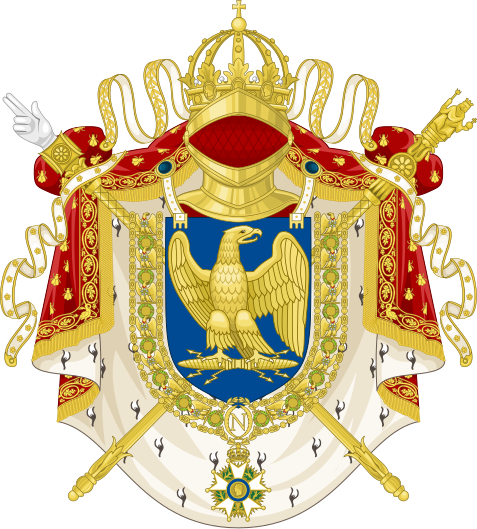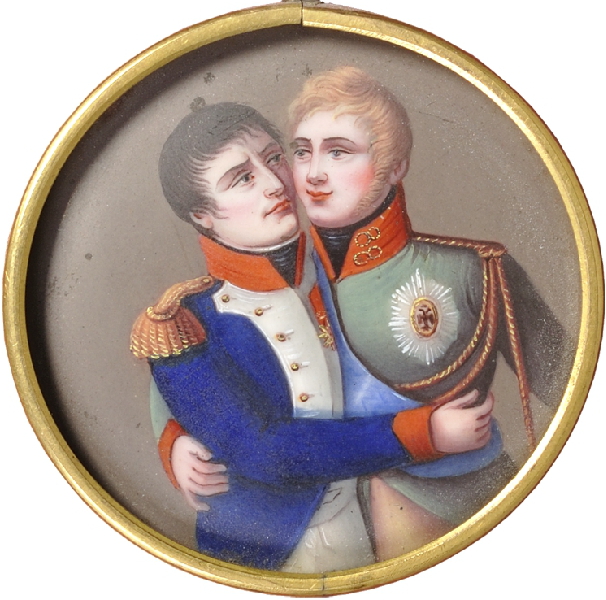Paix de Napoléon
Wait. Hold on just a minute. Stop.
We're not seriously going to this talking to myself bit, are we?
We are. So again: stop. What are you doing?
Making a timeline...
You have two already! Both which need updating! There's also that one about Princess Charlotte—
Shut up! I know! This a TLIAD. It's going to be finished within 24 hours. I haven't abandoned any of my TLs. They're just on hiatus. I'm trying to get the spark back, so this is what I'm doing. Something easy, something simple.
Sounds good... how long will the timeline run?
About a hundred years. I'm going to squeeze as much in as I can. This going to all be sorta spliced together, a blend of styles--from my more personal approach in my Charlotte and Restoration TLs to the history book style I favor in the Prince of Peace.
Okay. You've got me. One last question. What's the PoD?
It's pretty obvious. If you still don't understand, then here—let's get started. I'll even bold the hints. Besides, it's me: you know I love messing with people and making PoDs from some the smallest things!
Prologue
To Citizeness Josephine Bonaparte
May 13, 1796
So, it is true that you are pregnant.
Murat has written to me; but he tells me that it is making you ill and he thinks it unwise for you to undertake so long a journey. So I must still be deprived of the joy of holding you in my arms! I must still spend several months far from all that I love! Is it possible that I shan't have the pleasure of seeing you with your little belly?
That should make you interesting! You write that you have changed. Your letter is short and sad and shakily written. What is it, my adorable? What can be upsetting you? Oh! Don't stay in the country; go to town; try to amuse yourself, and remember that there is no truer torment for my soul than to know you unwell and unhappy. I thought I was jealous, but I swear to you I am not. I think I would rather myself give you a lover than to know you are miserable, so be gay and cheerful, and remember that my happiness depends on yours.
If Josephine is unhappy, if she lets herself be sad and discouraged, then she doesn't love me. Soon you are going to bring into the world another being who will love you as much as I-no, that is impossible, but your children and I will always be around you to convince you of our love and care. You won't be horrid, will you? No tantrums!! Except as a joke. And then just two or three pouts; nothing is prettier, and a little kiss puts everything right.
The courier has brought me your letter of the 18th. How sad it makes me! Can't you be happy, darling Josephine? Is there something you want? I am waiting patiently for Muray to know the details of what you are doing, what you are saying, whom you are seeing, what you are wearing. Everything to do with my adorable is dear to my heart, which only longs to know.
Things are going well here; but my heart is indescribably heavy. You are ill and far away from me. Be gay and take great care of yourself, you are worth more than all the universe to me. The thought that oyu are ill makes me very unhappy.
Please, my sweet, tell Freron that my family does not wish him to marry my sister, and that I am determined to takes steps to prevent it. Please tell my brother
B.
Wait. Hold on just a minute. Stop.
We're not seriously going to this talking to myself bit, are we?
We are. So again: stop. What are you doing?
Making a timeline...
You have two already! Both which need updating! There's also that one about Princess Charlotte—
Shut up! I know! This a TLIAD. It's going to be finished within 24 hours. I haven't abandoned any of my TLs. They're just on hiatus. I'm trying to get the spark back, so this is what I'm doing. Something easy, something simple.
Sounds good... how long will the timeline run?
About a hundred years. I'm going to squeeze as much in as I can. This going to all be sorta spliced together, a blend of styles--from my more personal approach in my Charlotte and Restoration TLs to the history book style I favor in the Prince of Peace.
Okay. You've got me. One last question. What's the PoD?
It's pretty obvious. If you still don't understand, then here—let's get started. I'll even bold the hints. Besides, it's me: you know I love messing with people and making PoDs from some the smallest things!
Paix de Napoléon

"If Josephine had been my mother,
my father would not have been buried at Saint Helena,
and I should not be at Vienna.
My mother is kind but weak;
she was not the wife my father deserved." ~ Napoleon II, Duke of Reichstadt

"If Josephine had been my mother,
my father would not have been buried at Saint Helena,
and I should not be at Vienna.
My mother is kind but weak;
she was not the wife my father deserved." ~ Napoleon II, Duke of Reichstadt
Prologue
To Citizeness Josephine Bonaparte
May 13, 1796
So, it is true that you are pregnant.
Murat has written to me; but he tells me that it is making you ill and he thinks it unwise for you to undertake so long a journey. So I must still be deprived of the joy of holding you in my arms! I must still spend several months far from all that I love! Is it possible that I shan't have the pleasure of seeing you with your little belly?
That should make you interesting! You write that you have changed. Your letter is short and sad and shakily written. What is it, my adorable? What can be upsetting you? Oh! Don't stay in the country; go to town; try to amuse yourself, and remember that there is no truer torment for my soul than to know you unwell and unhappy. I thought I was jealous, but I swear to you I am not. I think I would rather myself give you a lover than to know you are miserable, so be gay and cheerful, and remember that my happiness depends on yours.
If Josephine is unhappy, if she lets herself be sad and discouraged, then she doesn't love me. Soon you are going to bring into the world another being who will love you as much as I-no, that is impossible, but your children and I will always be around you to convince you of our love and care. You won't be horrid, will you? No tantrums!! Except as a joke. And then just two or three pouts; nothing is prettier, and a little kiss puts everything right.
The courier has brought me your letter of the 18th. How sad it makes me! Can't you be happy, darling Josephine? Is there something you want? I am waiting patiently for Muray to know the details of what you are doing, what you are saying, whom you are seeing, what you are wearing. Everything to do with my adorable is dear to my heart, which only longs to know.
Things are going well here; but my heart is indescribably heavy. You are ill and far away from me. Be gay and take great care of yourself, you are worth more than all the universe to me. The thought that oyu are ill makes me very unhappy.
Please, my sweet, tell Freron that my family does not wish him to marry my sister, and that I am determined to takes steps to prevent it. Please tell my brother
B.
Last edited:



